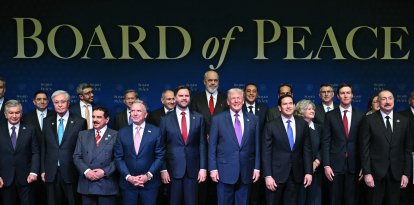Biden’s incompetence means American irrelevance
The problem isn’t just the administration’s misguided Mideast policies. A weak president guarantees the strengthening of American foes.

(Cordon Press)
Now that the dust has settled from President Joe Biden’s recent trip to the Middle East, it’s time for both his supporters and critics to admit that a lot of what they’ve been arguing about doesn’t matter as much as they think.
The debate in Israel about the visit seemed to center on whether the symbolism of Biden’s public reaffirmation of the alliance between the two countries proved more important than whether his policies are hurting the Jewish state, as well as its efforts to maintain an anti-Iran alliance with Arab nations. Contrary to the desires of his left-wing critics, Biden is preserving rather than unraveling the infrastructure of the U.S.-Israel relationship. That was enough for the political and media establishment in Israel to give him the hero treatment. At the same time, his insistence on continuing the effort to essentially revive former President Barack Obama’s approach to Iran and the Palestinians is deeply troubling. The same can be said for the minimal progress made on his watch towards expanding the Abraham Accords.
But while analyses of the impact of the shortcomings of the administration’s policies are needed, the discussion of the trip and its impact on the alliance must be placed in a broader perspective. The problem here isn’t so much Biden’s foolish approach to the question of how to stop Iran’s nuclear quest or how his gestures vis-à-vis the Palestinian Authority undermine rather than promote peace. It’s that a president who is widely perceived as both weak and unable to come up with or execute a coherent foreign-policy strategy is a liability to American allies, no matter how smart or stupid his specific initiatives may be.
Biden’s first 18 months in office have been a rough ride. Having come into office with high popularity ratings, his job approval numbers have tanked in the last year as the disaster in Afghanistan, record inflation created in part by out-of-control spending, supply-chain problems as a result of the worldwide fallout from the coronavirus pandemic and a sinking economy have undermined confidence in his leadership.
While some give him good marks for a robust response to Russian aggression against Ukraine, the strategy of isolating Russia and seeking to destroy its economy has backfired. The Russians may not have succeeded in conquering Ukraine, but they are no worse off than they were before their president, Vladimir Putin, gave the order to try to take over a neighboring country. By contrast, the United States has suffered greatly from Biden’s energy policies both at home due to the administration’s fealty to environmentalist doctrine and abroad stemming from the confrontation with Russia. Some of the blame for this belongs to Putin, but Biden’s mistakes are just as, if not more responsible, for the economic carnage this has created.
It was, after all, the fallout from Ukraine—and not a desire to achieve a “historic” breakthrough between Israel and Saudi Arabia—that prompted his recent trip. For all of the obsessive attention his activities in Israel received there, the main event was his subsequent visit to Riyadh. After pledging to treat the Saudis—and their de facto leader Crown Prince Mohammed bin Salman (MbS)—as a pariah nation, Biden was forced to go to the desert kingdom cap in hand to ask them to do something to lessen the consequences that his decisions have had on the U.S. economy. That meant swallowing his words and meeting with MbS.
The Saudi trip, along with the usual growing litany of Biden gaffes that fuel concerns about his age and health, displayed something that is a more fundamental problem. After dealing with an alternately hostile and then grudgingly friendly administration since January 2021, the Saudis seem to have come to the same conclusion about Biden as their Iranian foes. They regard him as a weak and unreliable leader and treated him accordingly
Yet that humiliation (and the foolish fist bump rather than handshake that he attempted with the prince) would have been nothing had it achieved something that would have helped America’s strategic dilemma. But it didn’t. The administration can point to some gestures about increasing oil production, but essentially, they got nothing from MbS that hadn’t already been in the works before the visit. That was made worse by the Saudi decision to contradict Biden’s account of his meeting with MbS in which he claimed to have raised human rights and the prince’s alleged responsibility for the murder of Jamal Kashoggi, a part-time Washington Post columnist, and likely agent of influence for Qatar and its Iranian allies.
There are serious questions to be raised about an American policy that seems to treat the defense of the territorial integrity of Ukraine as its top priority while at the same time pursuing appeasement of Iran and failing to come up with a consistent or coherent strategy for countering the influence of China.
But the Saudi trip, along with the usual growing litany of Biden gaffes that fuel concerns about his age and health, displayed something that is a more fundamental problem. After dealing with an alternately hostile and then grudgingly friendly administration since January 2021, the Saudis seem to have come to the same conclusion about Biden as their Iranian foes. They regard him as a weak and unreliable leader and treated him accordingly—an astonishing result given the enormous imbalance in power between the two countries.
Despite the fact that they are far better off when they are ignored by Washington and the international press, Israelis relished the attention they got from Biden. Prime Minister Yair Lapid and his ally, President Isaac Herzog, milked the occasion for all it was worth, heaping honors on the American leader in the hopes that it will help stave off the possibility of former Prime Minister Benjamin Netanyahu’s return to power in elections this fall. This involved papering over differences on important issues while treating small triumphs—like the direct flight between Israel and Saudi Arabia—as major ones, despite the failure of Jerusalem and Washington to move Riyadh to do more to formalize its alliance with the Jewish state.
But the Saudis made no secret of their disdain for Biden, giving him a far less lavish welcome than the one Trump received when he visited in 2017. Rather than seeking to please him, they were clear about their distrust. That dovetails with the Iranian evaluation of Biden, in which its representatives seem to relish the game of leading him on in negotiations in which American concessions are never enough to convince them to sign on to an even weaker nuclear deal than the one that Obama negotiated in 2015.
The perception of Biden’s incompetence is something that can be disputed as unfair by his dwindling band of supporters. But it goes beyond bad polling numbers and the White House’s inability to control the news cycle under virtually any circumstances. It also plays an outsized role in determining the ability of the United States to achieve its foreign-policy goals, regardless of whether the ideas behind them are sound or worthless. No matter what the cause, Biden’s appearances on the world stage do more harm than good.
All the Middle East trip accomplished was to expose the same factors that have undermined his administration and led to a collapse in public confidence. Over and above the mistakes Washington has made (and appears willing to continue to make in the region) that bodes ill for the U.S.-Israel alliance and the struggle against Iran.
© JNS

























